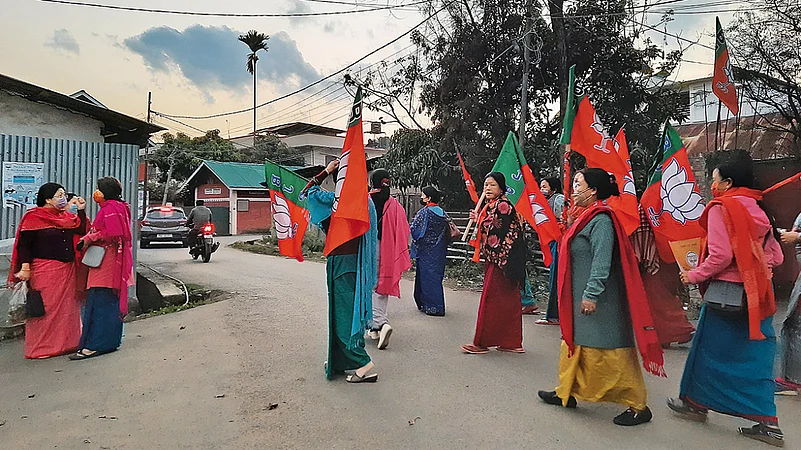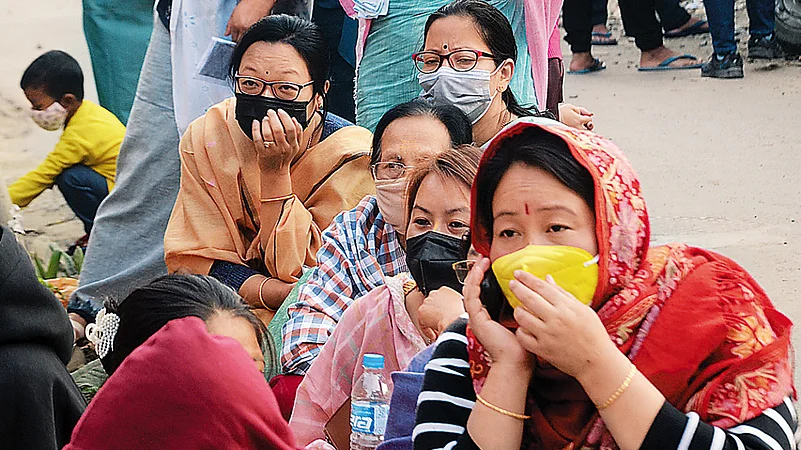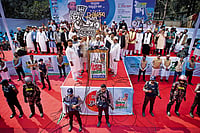It’s a strange December
I hear the neighbour’s kids singing the national anthem.
And I can’t find my peace or socks anywhere.
All I see is the stupid flags of the political parties.
It’s a carnival of lies
You can get your stalls easily
Just pick the colour!
If lucky they might give you a gun too.
On December 20, 2021, about two months before Manipur was to vote to elect a new government, singer-songwriter Chingangbam Akhu of the folk-rock music band Imphal Talkies fame wrote this verse on his Facebook profile. But if December was strange, February 2022 was stranger. Manipur, one of the last holds of secessionist insurgency in India’s northeast, is no stranger to violence. But this time it was different; it had a new face—electoral violence. It has been a bloody election without militant groups playing any significant role in it—and whatever role they played has been overshadowed by the scale of violence demonstrated by members and supporters of mainstream political parties.
A decade ago, Manipur stood witness to a violent election, thanks to the Coordination Committee, or CorCom, an umbrella of seven valley-based Meitei insurgent groups, which had initially “banned” the Congress from carrying out campaigns and later launched a series of
attacks on the party’s MLAs, candidates and offices, including a grenade attack. On election day, seven persons died during an attempt to capture a polling booth in the hill district of Chandel. The deceased included three polling staff, one security personnel, two voters and the gunman, who was suspected to be a member of the Naga insurgent group, National Socialist Council of Nagaland (Isak-Muivah), or the NSCN (I-M), which had a ceasefire agreement with the government of India.
The 2017 election was rather peaceful, with rebel groups keeping themselves off the election process, at least overtly. This year, the Meitei rebel groups have not involved themselves with the election process, except for calling for a shutdown during Prime Minister Narendra Modi’s visit to the state. The Naga rebel groups have not involved themselves, at least publicly, either. Only the Kuki rebel groups, which hold influence in some hill pockets, have openly taken a stance to support the BJP.
And yet, an Imphal-based civil society initiative playing watchdog to the elections documented 46 violent incidents, including four deaths, 10 bomb blasts, 15 incidents of violence using guns, and 19 incidents of ransacking of properties, even before the first phase of polling. All of them involved mainstream political parties. “The main highlight of the Manipur election 2022 is the escalating poll-related violent incidents,” reads a statement issued by Youth Collective Manipur, a civil society initiative, on February 26, two days before the first phase of the elections. “Such naked violence overshadowed other forms of poll violence.” Violence marred the polling day as well. By “other forms of poll violence”, it referred to another interesting twist to the elections: the “open intimidation” by Kuki militant groups “forcing members of its ethnic community to vote for one particular political party”, though without naming either the Kuki National Organisation (KNO) or the BJP. Is Manipur standing at a crucial juncture, when violence perpetrated by security forces and armed ethnic groups is going to be replaced, or superseded, by political violence?
Prime Minister Narendra Modi sought votes in the name of peace and development. “The BJP government has turned impossible into possible in Manipur. Be it the city or villages of Manipur, every area has got relief from bandh and blockade. Otherwise, the Congress government had made bandhs and blockades the fate of Manipur,” he said while addressing a rally in Imphal, the capital city of the state, in the last week of February. There have, indeed, been very few incidents of violence involving insurgent groups and security forces since N. Biren Singh took charge as the chief minister in 2017.
But Akhu refuses to credit the BJP for it. “If instances of human rights violations have reduced, that’s because of the progress of the case in the Supreme Court of India filed by the victims of such violence. There is no peace otherwise, it feels like the lull before a massive storm,” says the musician and human rights defender. The Extrajudicial Execution Victims’ Family Association (EEVFAM)’s 2012 petition in the apex court listing 1,528 cases of alleged extrajudicial killings in the state resulted in an enquiry by a commission that picked up six cases for investigation and found all of them to be unlawful. Thereafter, the court observed, “every death caused by the armed forces, including in the disturbed area of Manipur should be thoroughly enquired into if there is a complaint or allegation of abuse or misuse of power”. Whatever may have been the reason, there are people who believe the BJP should get credit for peace and another chance. “Why couldn’t Congress ensure peace? Now that there is a BJP government in power at the Centre, a BJP government in the state should deal with the issues better,” said Nongthombam Kiran Singh, a trader in Kakching town in the eponymous district.

If peace is one issue the BJP highlights, the other is development. Some of their propositions, such as the aggressive push for oil palm cultivation and plans to allow sales of foreign liquor triggered controversies. Manipur is a dry state, thanks to a movement led by women for many years.
Congress leader Rahul Gandhi has alleged that oil palm would have a huge environmental impact, while former Congress CM Okram Ibobi Singh has alleged that the attempt to allow sales of foreign liquor is “an insult to the mothers of Manipur”. However, there is one issue that BJP leaders love to highlight, from hoardings to speeches: that of railway connectivity to Imphal, expected to be realised in another couple of years. It will strengthen Manipur’s bond with the rest of India, BJP leaders have been arguing. As of now, the railway connects with Jiribam, a station on Manipur’s border with Assam.
In Manipur’s 50-year history as a state—it attained statehood from being a Union Territory in 1972—the Congress’ Ibobi Singh was the first chief minister to offer a stable government and complete the full five-year tenure (2002-2007). He then served two more full terms. However, during his final term (2012-2017), the party’s relations with Naga and Kuki groups significantly soured. Allegations of human rights violations had also contributed to Ibobi’s loss of popularity, even as he tried to portray himself as a saviour of the majority Meiteis, who live in the Imphal valley. Subsequently, in 2017, even though the Congress emerged as the single-largest party with 28 seats, the BJP with 21 seats managed to form the government with support from Naga People’s Front and National People’s Party—both of which had four MLAs—along with support from a Trinamool Congress MLA and an independent.

Five years down the line, the BJP seems to be high on confidence to return to power, despite all the infighting that resulted from a steady flow of defection from other parties—a problem of plenty. Resultantly, many of these disgruntled BJP leaders have joined the Janata Dal (United)—BJP’s alliance partner at the Centre and in Bihar—which has emerged as another significant player. It is the infighting in the BJP over distribution of tickets that has possibly led to the JD(U)’s rise to pre-poll prominence. Except for former cop Th. Brinda, who had been at loggerheads with the chief minister, most other JD(U) candidates were originally BJP ticket aspirants, a party leader from the valley says, unwilling to be identified. “In case of a hung verdict, the BJP would surely tie up with the JD(U) if they have MLAs and these MLAs can then bargain for ministerial posts,” the leader explains. With four-to-five-corner battles in most of the 60 seats, a hung verdict could not be ruled out, political observers say.
Confident BJP
If the N. Biren Singh government’s show of confidence is reflected in their decision to go to the 2022 elections sans their allies, without whom they would not have formed the government in 2017 in the first place, another move is to have made no promises in their manifesto on the two most sentimental issues in the state—that of withdrawal of the Armed Forces Special Powers Act (AFSPA), especially in the valleys, and that of passing the Autonomous District Council (ADC) Bill, which is a key demand in the tribal-dominated hill areas.
Manipur has many divides, conflicts and complexities in different ways—the Meitei community-dominated valley areas versus the
tribal-dominated hills and the Nagas versus the Kukis in the hills, for example. But for both the Nagas and the Kukis, the ADC has been a sentimental issue. According to Ts Mhanthung Anal, founder-president of Wisecrabs, a youth organisation based in Chandel, the autonomous district council is an issue close to the heart of most people living in the Manipur hills. “The ADC is close to our hearts because it’s about the rights of the tribal people living in Manipur’s hills and any party raising the issue should get people’s support,” he says.
In the hill areas dominated by the Nagas, Manipur’s second largest ethnic group, both the NPF and the BJP have claimed that the Naga peace deal, especially the one with the NSCN (I-M), was almost sealed. They both sought voters’ support to bring it to a logical conclusion, peacefully. In the valley, the BJP claims the introduction of the Inner Line Permit has been the Centre’s biggest gift to its people. The Youth Collective’s analysis of the poll manifestos of different parties, nevertheless, revealed that the BJP gave least importance to what they described as “people’s issues”, involving human rights, environment, drugs and women’s security.
However, according to an Imphal-based senior journalist who preferred to remain unnamed, the BJP is hoping to gain from the trend that the people of northeastern states usually go with the party in power at the Centre because insurgency-related issues are usually dealt with by the Union government. “Besides, there seems to be a huge influx of money in this election and I wonder how many people would resist the temptation of selling their votes cheaply,” the journalist says.
According to human rights activist Babloo Loitongbam of the Imphal-based Human Rights Alert (HRA), the unprecedented scale of electoral violence indicated the entry of black money from illegal drug smuggling rackets into the mainstream political arena. “Manipur’s drug economy, involving poppy cultivation and smuggling of drugs, is almost close to the state’s annual budget, according to an estimate. If this huge parallel economy enters the electoral democracy, it would have a disastrous impact on Manipur’s society,” he says.
(This appeared in the print edition as "Guns and Poses")


























